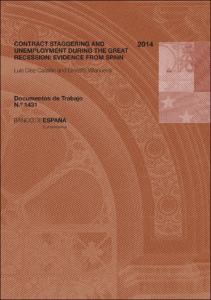Contract staggering and unemployment during the great recession : evidence from Spain
Autor
Fecha de publicación
31-dic-2014
Descripción física
51 p. : gráf., tab., fórmulas
Resumen
Una caída de la actividad agregada conlleva una reducción de la demanda de empleo, que es tanto mayor cuanto más rígidos sean los salarios. Este artículo examina el impacto de la rigidez salarial en España sobre la evolución del empleo entre 2009 y 2010. La extensión de los convenios colectivos de sector a todas las empresas en el ámbito negociado permite identifi car a los trabajadores sujetos a salarios mínimos de sector —una fuente de rigidez salarial—. El grado de rigidez salarial varía entre ámbitos de negociación, ya que los convenios negociados tras una caída de la actividad agregada pueden ajustar los salarios pactados, lo que no es posible para los convenios ya firmados. Así, los convenios firmados tras la quiebra de Lehman Brothers pactaron un incremento salarial para 2009 inferior en 1,3 puntos porcentuales al acordado en los convenios firmados antes del 15 de septiembre de 2008. Si se enlazan datos individuales de trabajadores afiliados a la Seguridad Social con registros de convenios, se descubre que los trabajadores cuyo convenio de sector fue pactado antes de la caída de Lehman Brothers tuvieron una probabilidad de perder el empleo en 1 punto por ciento superior a la del resto. Las caídas en el empleo se concentraron en los trabajadores cuyo salario antes de la recesión estaba próximo a la tarifa de convenio. Esta evidencia sugiere que la dificultad para renegociar contratos amplifica el efecto sobre el empleo de las fluctuaciones en la demanda agregada. Finalmente, se discute en qué medida estos resultados se pueden extrapolar a otros períodos
We study the impact of (widespread) downward wage rigidity on the flows from employment to non-employment at the onset of the Great Recession. Downward wage (growth) rigidity is due to the fact that sector-level collective agreements in Spain are automatically extended to all firms, setting wage minima for workers in the same province-industry-skill cell. We identify the impact of wage rigidity on employment because, unlike settled ones, newly bargained contracts can adjust to aggregate shocks. Using the exact dates of bargaining periods of all sector-level contracts in Spain, we find that agreements reached after the fall of Lehman Brothers were for an average wage growth of 1.8%, while agreements signed before 15 September 2008 were for mean wage increases of 3.1%. Matching information on collective agreements with longitudinal Social Security records on workers, we document two findings. Firstly, the probability of job loss between 2009 and 2010 was 1 percent higher among workers covered by agreements signed before the fall of Lehman Brothers than among workers covered by contracts signed afterwards. Secondly, the analysis of a subsample of contracts with information about the exact province-industry-skill level minimum wage suggests that the impact of date of contract signature on wage changes and employment losses is confi ned to workers whose pre-recession earnings were below 1.2 times the contract-specifi c minimum wage. Those findings are consistent with the hypothesis that the staggering of contracts and the inability to renegotiate contracts amplify aggregate shocks. We end with a discussion of whether those results can be extrapolated to other sample periods
We study the impact of (widespread) downward wage rigidity on the flows from employment to non-employment at the onset of the Great Recession. Downward wage (growth) rigidity is due to the fact that sector-level collective agreements in Spain are automatically extended to all firms, setting wage minima for workers in the same province-industry-skill cell. We identify the impact of wage rigidity on employment because, unlike settled ones, newly bargained contracts can adjust to aggregate shocks. Using the exact dates of bargaining periods of all sector-level contracts in Spain, we find that agreements reached after the fall of Lehman Brothers were for an average wage growth of 1.8%, while agreements signed before 15 September 2008 were for mean wage increases of 3.1%. Matching information on collective agreements with longitudinal Social Security records on workers, we document two findings. Firstly, the probability of job loss between 2009 and 2010 was 1 percent higher among workers covered by agreements signed before the fall of Lehman Brothers than among workers covered by contracts signed afterwards. Secondly, the analysis of a subsample of contracts with information about the exact province-industry-skill level minimum wage suggests that the impact of date of contract signature on wage changes and employment losses is confi ned to workers whose pre-recession earnings were below 1.2 times the contract-specifi c minimum wage. Those findings are consistent with the hypothesis that the staggering of contracts and the inability to renegotiate contracts amplify aggregate shocks. We end with a discussion of whether those results can be extrapolated to other sample periods
Publicado en
Documentos de Trabajo / Banco de España, 1431
Materias
Demanda de trabajo; Negociación colectiva; Rigidez salarial; Perturbaciones agregadas; Collective bargaining; Labor demand; Aggregate shock; Wage rigidity; Relaciones laborales; Mercado de trabajo
Aparece en las colecciones:












